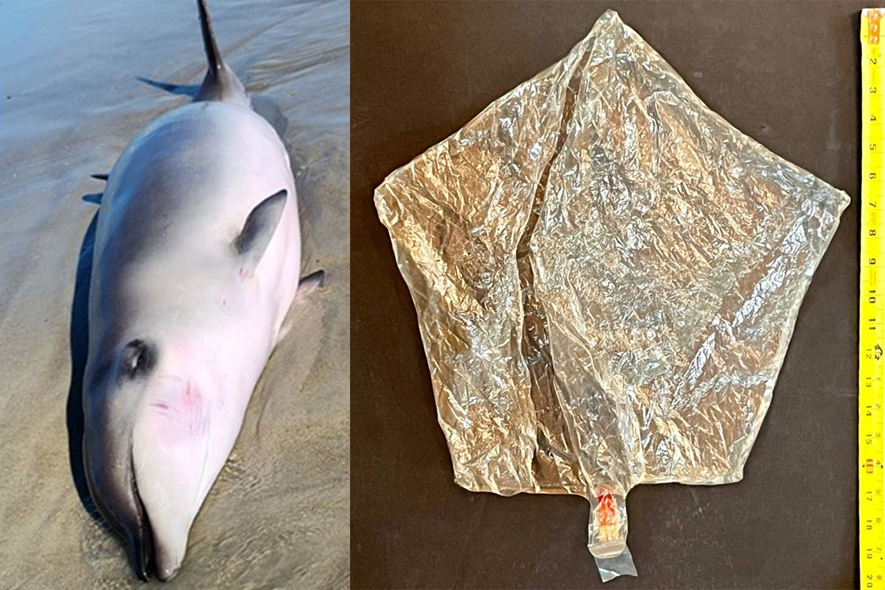
The UNCW Marine Mammal Stranding Program recently collaborated with marine mammal scientists, veterinarians, and students from a variety of state institutions and agencies to study a Gervais’ beaked whale (Mesoplodon europaeus) that washed ashore alive in Emerald Isle, NC on Oct. 30. The animal expired shortly after being on the beach, and scientists discovered the whale died from ingesting a plastic balloon.
According to Michael Tift, an Assistant Professor in the UNCW Department of Biology and Marine Biology and Director of the UNCW Marine Mammal Stranding Program, approximately 125 marine mammals strand on North Carolina’s beaches each year, including whales, dolphins, porpoises, seals, and manatees.
“There are many reasons that these marine mammals will strand on beaches, but we really never know the cause until we conduct an investigation,” Tift said. “A few reasons that can cause these animals to strand on our beaches include diseases, wounds from other animals, ship or boat strikes, entanglement in fishing gear, and ingestion of human-manufactured products such as plastic. Unfortunately, it is common for us to identify plastic ingestion as the cause of death in these rare deep-diving marine mammals.”
Beachgoers first reported seeing the animal live in the shallow waters, an unusual sighting of the Gervais’ beaked whale because this species normally lives several hundred miles offshore on the continental shelf edge and beyond.
A team from the NC Marine Mammal Stranding Network, a statewide collective of dedicated scientists and volunteers led by Vicky Thayer, responded and confirmed the animal was a 10’ 9” (329 cm) long female calf and had died.
With the assistance of beachgoers, the Emerald Isle Public Works and the Emerald Isle Police Department, the dead stranded whale was taken to NC State University (NCSU) Center for Marine Sciences and Technology (CMAST). Teams of marine mammal scientists, veterinarians, and students from UNCW, NCSU College of Veterinary Medicine, NC Aquariums, Duke University Marine Laboratory, University of North Carolina Chapel Hill Institute of Marine Sciences, North Carolina Maritime Museum Bonehenge Whale Center and the North Carolina Division of Marine Fisheries worked together at CMAST on the necropsy to learn more about the death of the animal.
The investigation revealed milk in the stomach, indicating the whale was a nursing calf. Scientists also discovered a crumpled-up plastic balloon that was obstructing the gastrointestinal tract, revealing the whale’s cause of death.
The marine mammal teams are passionate about creating awareness of the dangers of balloons to wildlife. As in the case of this Gervais’ beaked whale, inflated balloons that float away and end up on land or sea can be tragic for animals, causing them to starve and perish over time if ingested.
Tift and other members from the NC Marine Mammal Stranding Network encourage consumers to consider using biodegradable alternatives such as paper decorations, flowers, or candles instead of balloons to celebrate important life events or to honor loved ones. Deflating balloons and removing all gases prior to discarding them can also help.
“Ingestion of these balloons can cause pain, suffering, and ultimately the death of many wild animals,” said Tift, speaking as a scientific researcher. “It is terribly similar to the ingestion or encounter with plastic straws and other plastic products many have seen cause injury or death in sea turtles and sea birds. I have seen Mylar® balloons in some of the most remote places on the planet and have witnessed their devastating effects on wildlife. I encourage lawmakers to consider banning these products.”
Learn more about UNCW’s Marine Mammal Stranding Program on our website.
To report a marine mammal stranding, call:
This article has the following tags: Research & Innovation College of Science & Engineering